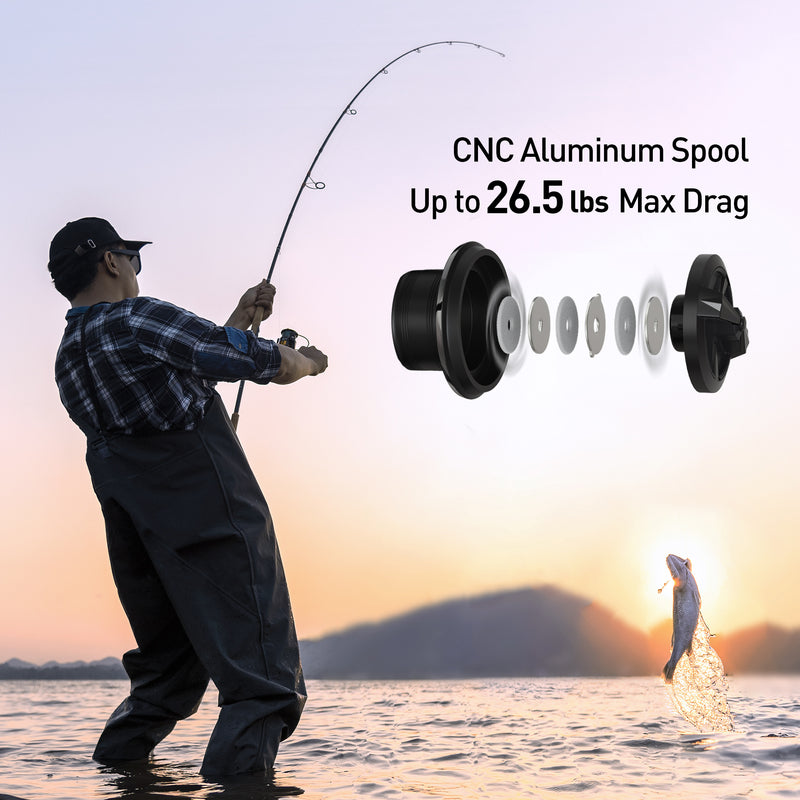Unlock the Secrets to Mastering Spinning Saltwater Fishing Reels!
Spinning saltwater fishing reels are an essential tool for anglers seeking a successful day on the water. These reels offer an incredible combination of ease of use, versatility, and adaptability, making them a favorite among both novice and experienced fishermen. With spinning reels, you can enjoy the thrill of catching a variety of saltwater species, from snappy snapper to fierce tuna, all while experiencing the beautiful surroundings of the ocean. In this article, we will delve into choosing the right spinning saltwater fishing reel, understanding its components, and mastering techniques for effective use. Whether you’re just starting or looking to enhance your skills, this guide will help you unlock the secrets to becoming a proficient saltwater angler.

Understanding Spinning Saltwater Fishing Reels
At the heart of every spinning saltwater fishing reel lies a sophisticated mechanism that allows for smooth casting and retrieval. The main components of these reels include the spool, drag system, and bail. The spool holds the fishing line and is designed to release it smoothly during casting, while the drag system controls the resistance a fish feels when it pulls on the line, preventing breakage. The bail acts as a gate, enabling the line to be released or retrieved. One of the standout features of spinning reels is their open-faced design, which provides greater visibility of the line and allows for easier handling compared to baitcasting reels. This combination of components contributes to the performance of spinning reels in challenging saltwater environments, where conditions can be unpredictable, and the fish are often more aggressive.
Choosing the Right Spinning Saltwater Fishing Reel
Selecting the right spinning saltwater fishing reel involves considering several critical criteria. First, the size of the reel should correspond to the type of fish you aim to catch. Larger fish require more robust reels with higher line capacity and stronger drag systems. Gear ratio is another essential factor; a higher gear ratio allows for quicker retrieval, which is beneficial when reeling in fast-moving species. Additionally, the line capacity must be sufficient to handle the length of line required, especially when fishing in deep waters. Matching the reel to the specific fishing conditions, such as surf fishing or boat fishing, can significantly enhance your chances of success. A friend of mine, an avid angler, always emphasizes the importance of testing a reel's smoothness and balance before making a purchase, ensuring that it feels comfortable in hand.
Material Considerations
The materials used in the construction of spinning saltwater fishing reels play a vital role in their performance and longevity. Corrosion resistance is paramount, given the harsh saltwater environment. Graphite reels are lightweight and resistant to rust but may not be as durable as aluminum or stainless steel options. Aluminum reels, while slightly heavier, offer superior strength and durability, making them suitable for larger species. Stainless steel components enhance corrosion resistance and provide additional strength, especially in critical areas like the drag system. Ultimately, choosing a reel made from high-quality materials will ensure a better fishing experience and extend the life of the equipment.
Techniques for Using Spinning Saltwater Fishing Reels
Mastering the techniques involved in using spinning saltwater fishing reels is essential for maximizing your fishing success. When casting, it’s important to hold the line with your finger to control the release and avoid line twists and backlash. A smooth, fluid motion is key to achieving long casts. Once you have cast your line, retrieval techniques vary based on the species targeted. For instance, when fishing for species that prefer quick bursts, such as mackerel, a fast retrieval can entice them to strike. Conversely, when targeting species like grouper that dwell near the bottom, a slow and steady retrieval mimicking the natural movement of prey can be more effective. Engaging with seasoned anglers can provide valuable insights into these techniques, as shared experiences often reveal the nuances that lead to successful fishing outings.
Regular Maintenance and Care
Additionally, proper maintenance can ensure that your spinning saltwater fishing reel performs optimally for years to come. Regularly checking each component for buildup and debris is crucial. Rinse your reel with fresh water after every fishing trip to prevent corrosion and ensure everything is in working order. Lubricating moving parts and storing your reel in a cool, dry place away from direct sunlight will also help maintain its performance. Remember, a well-cared-for reel will last longer and improve your fishing experience.
Maximizing Your Fishing Experience
In summary, spinning saltwater fishing reels are invaluable tools for any angler looking to explore the depths of the ocean. By understanding the mechanics, selecting the right reel, and mastering effective techniques, you can significantly enhance your fishing experiences. Remember, the right reel paired with proper care and techniques can lead to more successful outings and unforgettable memories. So gear up, practice your skills, and enjoy every moment you spend on the water!








